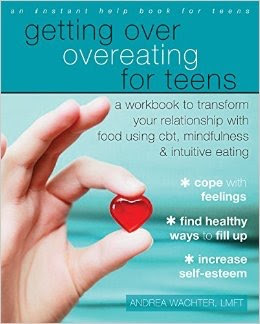I'm so pleased to welcome back psychotherapist Andrea Wachter, who is sharing excerpts from her latest book. Although this book is geared towards teenagers, it can benefit people of any age!
The following excerpts are from Getting Over Overeating for Teens by
Andrea Wachter, LMFT. They are reprinted with permission from New Harbinger
Publications, Inc. copyright
© 2016 For more details, click here: http://www.andreawachter.com/books/
If you’ve been struggling with overeating,
you’re not alone. And the most important thing to know is that it is not your
fault! We live in a culture that gives us some pretty crazy messages about
food, fitness, and feelings. On top of that, most teens have lots of stress
dealing with friends, family, and finals. (Well, homework too, but I was on
such a roll with words that start with F I figured I’d go with finals!)
Most of us, including our parents, haven’t been
taught how to deal with food, fitness, and feelings in really healthy ways. We
all get taught the same mixed messages—but the good news is that we can
actually delete our unhealthy habits and upgrade to healthier ones.
Let’s start out with a quick definition of
overeating, and how it’s different from bingeing. Overeating is when you eat
more than your body needs. Even people who have a totally healthy relationship
with food will overeat occasionally. It becomes a problem only if they do it
too often or if it has negative consequences.
Binge eating is when someone eats a large amount
of food in a short amount of time. They usually eat fast and until they are
stuffed and ashamed. And they usually eat over painful emotions and thoughts,
rather than out of true physical hunger.
I started overeating (and dieting, sneak eating,
bingeing, and struggling with my weight) when I was a teenager. It took me a
lot of years and tears to find the right kind of help, but I finally did. And
now I have the privilege of teaching others (including you) all the things that
helped me get over overeating.
Even though overeating can feel pretty
comforting while we’re doing it, it can definitely leave us feeling pretty
lousy after we’re done. And no matter how good food tastes while it’s going
down, if we’re eating more than our body needs and for reasons that have
nothing to do with physical hunger, it’s going to have negative effects—
physically, emotionally, mentally, and socially.
Overeating is definitely one way to stuff down
painful feelings. The only problem is that when we stuff down our pain, we also
stuff down our passion, happiness, and excitement. It’s like damming a river;
you hold back all the water, not just some of it.
Getting over overeating means getting back some
of the joy, excitement, and peace that might be missing in your life. It means finding
healthier ways to get sweetness and comfort. It means learning to eat foods you
really love, in amounts that satisfy your body’s needs, and finding new ways to
satisfy the rest of your needs.
Don’t Believe Everything You Think!
Have you ever had the experience where one
minute you’re going about your day feeling fine and the next minute you have a
horrible thought? It’s probably not because something horrible happened. Well,
maybe something happened, but usually it’s because a horrible thought popped
into your mind.
We all have automatic thoughts that pop up in
our minds, just like we have pop-up ads on
our computer screens. It’s so easy to believe our thoughts. After all, they are
our thoughts! They seem and feel so real, but the truth is, our thoughts aren’t
always real, and they sure aren’t always helpful, kind, or true. The good news
is that, just like we can close those unwanted pop-up ads on our computers with
a simple click, we can learn to close the pop-ups in our minds.
Filling Up Without Feeling Down
It’s pretty easy in our fast-paced world to focus on feeding
our bodies and feeding our minds. But if we want to get over overeating, we
also have to feed the deeper parts of ourselves that can’t be seen, the parts
of us that have nothing to do with the material world—our hearts and our souls.
These are places that food won’t fill. If we overfeed our bodies, we might be
full, but not truly fulfilled. If we feed only our minds, we might think and
learn a lot, but we won’t be really satisfied. We all need to fill our spirits
too, on a regular basis. When you truly feed your spirit, you feel better
afterward. You feel truly filled up, and there are no negative or harmful
consequences.
Andrea Wachter is a Licensed
Marriage and Family Therapist and author of Getting Over Overeating for
Teens. She is also co-author of Mirror,
Mirror on the Wall: Breaking the “I Feel Fat” Spell and The Don’t Diet, Live-It Workbook. An inspirational counselor, author and
speaker, Andrea uses professional expertise, humor and personal recovery to
help others. For more information on her books, blogs and other services,
please visit: www.andreawachter.com

1 comment:
Thank you for sharing this information with us, Your blog has helped me regarding Online Doctor of Psychology Programs California and significantly other information, I trust other individuals are also loving it.
Post a Comment